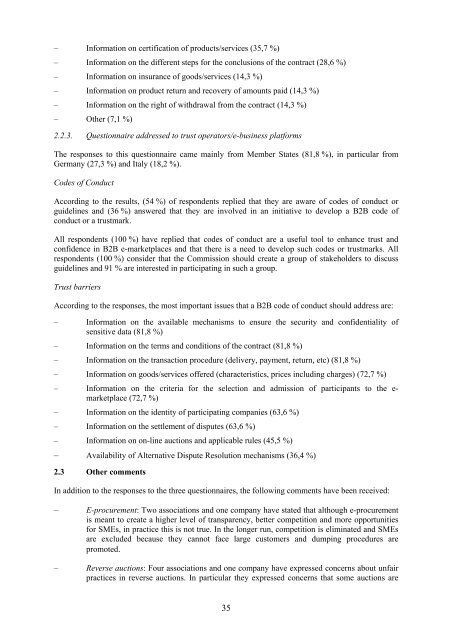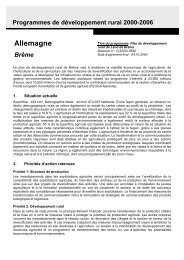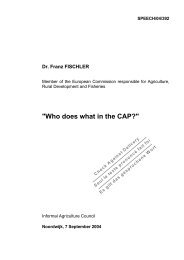B2B Internet Trading Platforms - EDIS
B2B Internet Trading Platforms - EDIS
B2B Internet Trading Platforms - EDIS
You also want an ePaper? Increase the reach of your titles
YUMPU automatically turns print PDFs into web optimized ePapers that Google loves.
– Information on certification of products/services (35,7 %)<br />
– Information on the different steps for the conclusions of the contract (28,6 %)<br />
– Information on insurance of goods/services (14,3 %)<br />
– Information on product return and recovery of amounts paid (14,3 %)<br />
– Information on the right of withdrawal from the contract (14,3 %)<br />
– Other (7,1 %)<br />
2.2.3. Questionnaire addressed to trust operators/e-business platforms<br />
The responses to this questionnaire came mainly from Member States (81,8 %), in particular from<br />
Germany (27,3 %) and Italy (18,2 %).<br />
Codes of Conduct<br />
According to the results, (54 %) of respondents replied that they are aware of codes of conduct or<br />
guidelines and (36 %) answered that they are involved in an initiative to develop a <strong>B2B</strong> code of<br />
conduct or a trustmark.<br />
All respondents (100 %) have replied that codes of conduct are a useful tool to enhance trust and<br />
confidence in <strong>B2B</strong> e-marketplaces and that there is a need to develop such codes or trustmarks. All<br />
respondents (100 %) consider that the Commission should create a group of stakeholders to discuss<br />
guidelines and 91 % are interested in participating in such a group.<br />
Trust barriers<br />
According to the responses, the most important issues that a <strong>B2B</strong> code of conduct should address are:<br />
– Information on the available mechanisms to ensure the security and confidentiality of<br />
sensitive data (81,8 %)<br />
– Information on the terms and conditions of the contract (81,8 %)<br />
– Information on the transaction procedure (delivery, payment, return, etc) (81,8 %)<br />
– Information on goods/services offered (characteristics, prices including charges) (72,7 %)<br />
– Information on the criteria for the selection and admission of participants to the e-<br />
marketplace (72,7 %)<br />
– Information on the identity of participating companies (63,6 %)<br />
– Information on the settlement of disputes (63,6 %)<br />
– Information on on-line auctions and applicable rules (45,5 %)<br />
– Availability of Alternative Dispute Resolution mechanisms (36,4 %)<br />
2.3 Other comments<br />
In addition to the responses to the three questionnaires, the following comments have been received:<br />
– E-procurement: Two associations and one company have stated that although e-procurement<br />
is meant to create a higher level of transparency, better competition and more opportunities<br />
for SMEs, in practice this is not true. In the longer run, competition is eliminated and SMEs<br />
are excluded because they cannot face large customers and dumping procedures are<br />
promoted.<br />
– Reverse auctions: Four associations and one company have expressed concerns about unfair<br />
practices in reverse auctions. In particular they expressed concerns that some auctions are<br />
35





